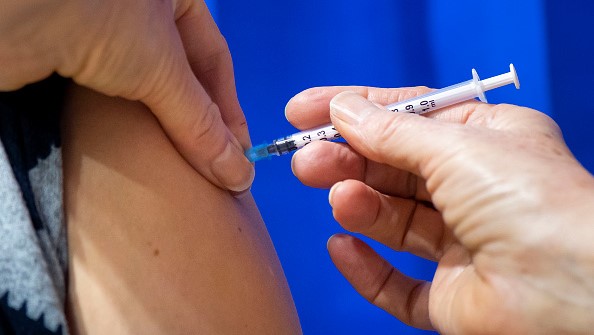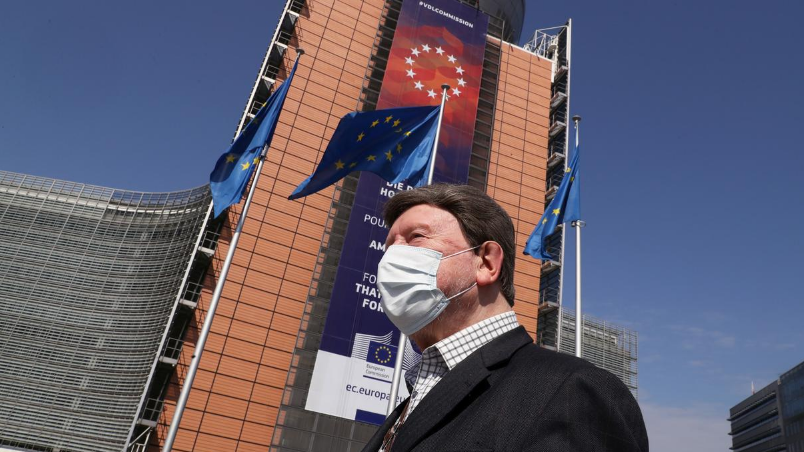
Editor's note: Bradley Blankenship is a Prague-based American journalist, political analyst and freelance reporter. The article reflects the author's opinions and not necessarily the views of CGTN.
Despite heavy criticism, the EU has moved forward on an unprecedented effort to acquire vaccines for all 27 of its member states in a way that is quite remarkable. Many smaller member states would have never been able to adequately secure proper doses if it were not for the EU bloc negotiating together. Nonetheless, the EU is still struggling to meet demand and the European Commission's efforts in acquiring vaccines have been far from perfect.
In fact, recent polls suggest that many Europeans are specifically pointing blame at Brussels for its handling of the vaccine rollout. According to a poll by Kekst CNC, 51 percent of Germans believe the EU has handled the rollout badly, which is also the same view as 35 percent of French and 24 percent of Swedish respondents.
AstraZeneca's delivery shortfall was indeed a massive blow to the EU's vaccine campaign. The company told the commission and member states on January 22 that it would only be able to deliver less than a third of the promised 100 million doses of its vaccine by the end of March, which seemed to shatter hope.
Though AstraZeneca was able to agree to deliver more doses in the first quarter after hard-fought negotiations, the relationship between the EU and Big Pharma is left soured. According to the previously mentioned poll, however, citizens believe the onus is with the EU and national governments more than with drug companies.
Some have also criticized the EU for being slow to approve vaccines, which has caused rollout to lag behind its peers, though the European Commission has dismissed this criticism because of the potential health risks posed by hastily approved vaccines.
To contrast, the United States and the United Kingdom are both ramping up their vaccine rollout, with the U.S. now saying all adults could have a dose by the end of May and the UK saying the same but by the end of June. This was because they invested significantly more upfront per capita in vaccine development and manufacturing capacity than the EU. The EU is now dependent on these countries – which are putting their needs first – for its vaccine supply.
As some EU member states face resurgent coronavirus outbreaks, many are breaking off from the centralized vaccine rollout plan because of supply hangups.

A man wearing a face mask walks past the European Commission headquarters as the spread of coronavirus disease (COVID-19) continues in Brussels, Belgium, April 9, 2020. /Reuters
A man wearing a face mask walks past the European Commission headquarters as the spread of coronavirus disease (COVID-19) continues in Brussels, Belgium, April 9, 2020. /Reuters
Austrian Chancellor Sebastian Kurz said that his country will work with Israel and Denmark on future vaccine development and visited Israel on March 4, specifically citing the European Medicines Agency (EMA)'s slow authorization process as a major reason to splinter off. Danish Prime Minister Mette Frederiksen also made similar remarks.
Visegrad Four (V4) countries are also turning to Russian and Chinese vaccines. At the end of January, Hungary became the first member state to approve China's Sinopharm vaccines just a week after buying Russia's Sputnik V vaccine. Prime Minister Viktor Orban even took the Sinopharm shot himself.
Neighboring Slovakia granted emergency authorization to Sputnik V on March 1, the same day that Polish President Andrzej Duda spoke with Chinese President Xi Jinping about purchasing Chinese COVID-19 vaccines.
The Czech Republic, which is currently going through the worst per capita coronavirus outbreak in the world, requested Sinopharm vaccines from China on Thursday. President Milos Zeman also said at the end of February that Russia is ready to deliver Sputnik V.
Some are painting these divergences as another rendition of the EU's battles with some member states over the rule of law, corruption, nationalism or separatism. But this is not an ideological fight at all and, in fact, approving the use of these vaccines would support the EU's self-professed foreign policy interest of strategic autonomy. It would actually make the EU more independent.
The evidence backing the usage of Chinese and Russian vaccines is immense, and there is simply no good reason not to move forward on procuring them when other avenues aren't working. Many EU leaders can clearly see this. The EMA appears to be at least moving forward with Sputnik V, announcing on Thursday that it started a rolling review that will "take less time than normal to evaluate."
In terms of reliance on Western vaccines, a recent report by The Intercept's Lee Fang on Wednesday noted that U.S. drug industry lobbies are calling for punishment against countries, including Hungary, "for seeking to ramp up the production of COVID-19 vaccines and therapeutics without express permission from pharmaceutical companies."
The EU should take a lesson from its negotiations with AstraZeneca and look to expand its procurement options away from just Western vaccines, because it could end up empty-handed again with nowhere else to go or potentially even spark a trade dispute with the United States. There's no shame in doing whatever it takes to save lives.
(If you want to contribute and have specific expertise, please contact us at opinions@cgtn.com.)

